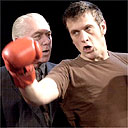
Unless you are the RSC and feel obliged at least once in a blue moon to tackle the entire Shakespearean canon including those plays of doubtful authenticity, there is no unearthly reason why you would want to stage Henry VIII.
Director Phil Willmott, who much deserves his fast-growing reputation and staged a really terrific Titus Andronicus last year, finds a reason. In this Golden Jubilee year he draws parallels with the court of Henry Tudor with its silky spinning politicians such as Wolsey and arranged royal marriages, and our own time. All the same I can't help thinking it would have been better for him and us if he had decided to do Macbeth instead.
Henry VIII is less well-known for its dramatic qualities than its notoriety, being the play whose 1613 premiere at the Globe led to the theatre's demise when a canon fired as a 17th century special effect lit the theatre's thatch and started a fire.
Willmott, who has come up with a nifty adaptation of the original, doesn't so much make a case for the play as blow it out of the water. This is Henry V111 set in a noirish world of TV reporters and political double dealing, scheming women on the make and a slightly dim, easily led king. The pace is fast, tight and wired. The slick surface of the court hides intrigue.
Some bits work very well, particularly in the second half when the ruthless Wolsey, outwitted in his own game, falls from power and is reduced to feeding the ducks in the park. There is also pathos in Henry's belated realisation that he has ditched the only woman he really loved, Katherine, for the social-climbing minx Anne Boleyn.
Unfortunately at the preview performance I saw, the performances still lacked the attack and style of the production, creating a vacuum at the heart of the evening. Neither does Willmott entirely solve the difficulties for a modern audience inherent in the play's final scenes which are a blatant example of Shakespeare's own political mythologising.
But Willmott dispels the myth that this is a play only interesting for its pageantry, and shows it to be a play of more probing psychological insight than one might have guessed. If the evening doesn't entirely work, its intelligence and stagecraft still shine through.
· Until June 29. Box office: 020 7936 3456

